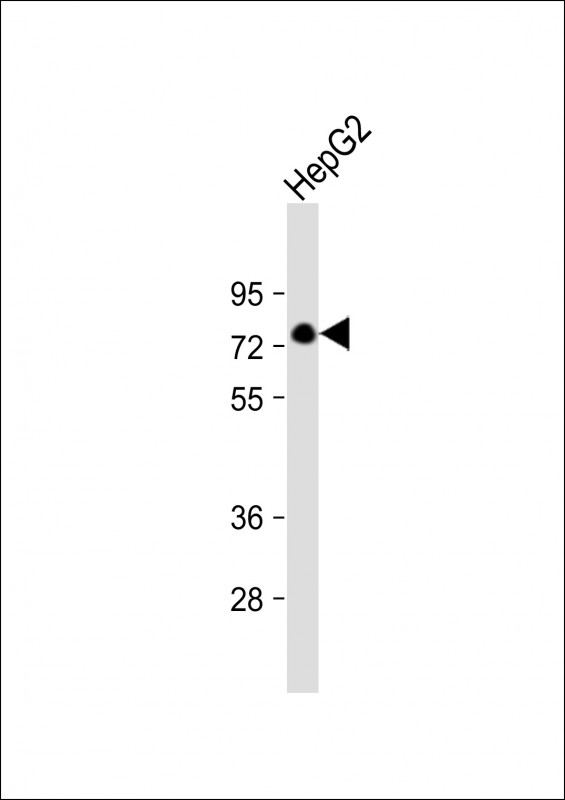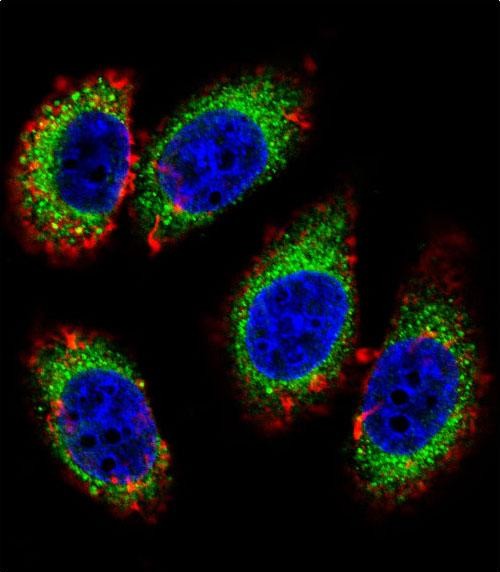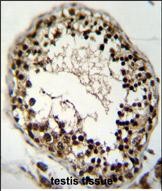


| WB | 1/1000 | Human,Mouse,Rat |
| IF | 咨询技术 | Human,Mouse,Rat |
| IHC | 1/100-1/500 | Human,Mouse,Rat |
| ICC | 1/10-1/50 | Human,Mouse,Rat |
| FCM | 咨询技术 | Human,Mouse,Rat |
| Elisa | 咨询技术 | Human,Mouse,Rat |
| Aliases | Far upstream element-binding protein 2, FUSE-binding protein 2, KH type-splicing regulatory protein, KSRP, p75, KHSRP, FUBP2 |
| Entrez GeneID | 8570 |
| WB Predicted band size | 73.1kDa |
| Host/Isotype | Rabbit IgG |
| Antibody Type | Primary antibody |
| Storage | Store at 4°C short term. Aliquot and store at -20°C long term. Avoid freeze/thaw cycles. |
| Species Reactivity | Human |
| Immunogen | This KHSRP antibody is generated from rabbits immunized with a KLH conjugated synthetic peptide between 470-498 amino acids from the Central region of human KHSRP. |
| Formulation | Purified antibody in PBS with 0.05% sodium azide. |
+ +
以下是关于KHSRP抗体的3篇参考文献示例,涵盖不同研究领域和应用场景:
---
1. **文献名称**:*KHSRP controls Mycobacterial infection through regulation of TLR4 signaling*
**作者**:Ben et al.
**摘要**:研究通过Western blot(使用兔源KHSRP抗体)和免疫共沉淀技术,发现KHSRP通过调控TLR4信号通路相关mRNA的稳定性,影响巨噬细胞对分枝杆菌感染的免疫应答。
2. **文献名称**:*KHSRP promotes colorectal cancer metastasis by modulating focal adhesion pathway*
**作者**:Wang et al.
**摘要**:利用小鼠单克隆KHSRP抗体进行免疫组化和RNA结合实验,揭示KHSPR通过结合黏着斑通路相关mRNA并促进其降解,从而增强结直肠癌细胞的侵袭和转移能力。
3. **文献名称**:*KHSRP-mediated RNA stability in neuronal development and disease*
**作者**:Hosoda et al.
**摘要**:通过免疫荧光(使用KHSRP抗体标记)和RNA测序,发现KHSRP在神经元发育中通过调控神经突生长相关mRNA的稳定性,其功能异常可能与神经退行性疾病相关。
---
**注**:以上文献为示例,实际引用时需核实具体来源及准确性。建议通过PubMed或Google Scholar搜索“KHSRP antibody”及相关研究领域关键词,筛选近期高影响力论文。
The K homology-type splicing regulatory protein (KHSRP), also known as KSRP, is an RNA-binding protein involved in post-transcriptional regulation of gene expression. It contains four K homology (KH) domains that enable binding to AU-rich elements (AREs) in the 3' untranslated regions (UTRs) of target mRNAs, influencing their stability, translation, or decay. KHSRP plays dual roles depending on cellular context: it can promote mRNA degradation by recruiting exonucleases like the exosome or enhance mRNA processing and translation by interacting with microRNAs or other RNA-binding proteins. It is implicated in immune responses, neuronal development, and cancer progression, where dysregulation contributes to altered expression of cytokines, growth factors, and oncogenes.
KHSRP antibodies are essential tools for studying its molecular functions. These antibodies are used in techniques such as Western blotting, immunoprecipitation, and immunofluorescence to detect KHSRP expression, localization, and interactions. Validated antibodies help elucidate its role in RNA metabolism pathways and disease mechanisms. Commercial KHSRP antibodies are typically raised in rabbits or mice against specific epitopes, with validation via knockout controls or siRNA-mediated knockdown. Researchers rely on these reagents to explore KHSRP's involvement in cellular stress responses, differentiation, and pathologies like neurodegeneration or inflammation-driven cancers. Proper antibody validation remains critical to ensure specificity in experimental models.
×